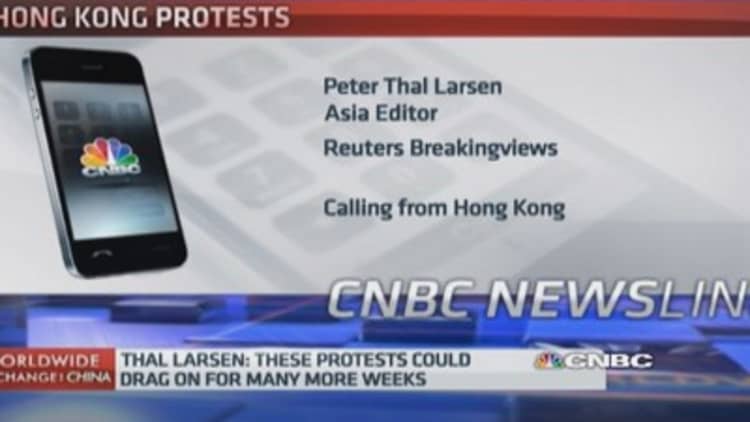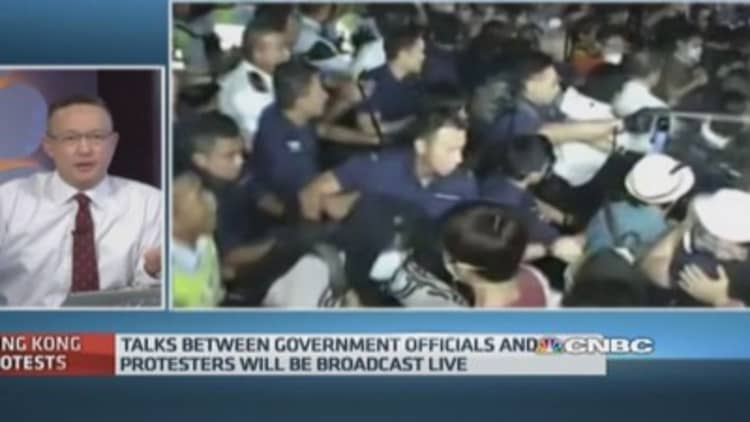At 6:49 a.m. on Oct. 17, not long after the police completed a predawn operation to clear a volatile protest camp in Hong Kong's densely populated Mong Kok neighborhood, someone posted a "call to action" on a popular online forum, urging residents to retake the streets.
"Tonight, if you're a man, let's revive Mong Kok," a user calling himself Li Siu-ming wrote on the HKGolden website. "If there are no other options, we will have to blockade the railway station, paralyze the MTR," he added, referring to the city's subway system.
There was little to distinguish his posts from others online about the pro-democracy demonstrations that have disrupted Hong Kong for more than a month. But the next day, the police demanded user data related to his messages, according to HKGolden's manager.
Several hours later, officers arrested a 23-year-old man at his home, saying he had "incited others on an online forum to join the unlawful assembly in Mong Kok, to charge at police and to paralyze the railways." In announcing the arrest, a police spokesman, Hui Chun-tak, made a sweeping assertion: It is a crime in Hong Kong to post messages calling on people to attend the protests.
Read MoreNine out of 10 Hong Kong activists say will fight on for a year
"I stress, inciting others to commit criminal acts on the Internet is illegal," he said.
The warning, along with a refusal to disclose more information about the case, has heightened fear that the authorities in this former British colony have begun to police the Internet using methods more often associated with the security forces in mainland China, where web censorship is routine and a crackdown on online dissent has been underway for more than a year.
Hong Kong has enjoyed a high degree of autonomy since its return to Chinese rule in 1997, retaining a Western-style legal system and protections for freedom of speech. But concern about China's growing influence and anxiety that the territory is becoming more like the rest of China have helped fuel protests demanding open elections for the city's next leader.
"The protests are about protecting these Hong Kong values and freedoms from mainland encroachment," said Maya Wang, a Hong Kong-based researcher for Human Rights Watch, adding that the arrest "raises suspicions and questions precisely about these values' being eroded."

Given the protests, she said, it is "even more urgent for the government to clarify why this act of law enforcement is not encroaching on these freedoms."
The police have declined to provide the exact language that prompted the arrest or to confirm any link to the messages posted on the HKGolden forum. But Joe Lam, the site's chief executive, said officers had demanded that he provide them with the Internet Protocol addresses and messages associated with the Li Siu-ming account.
In addition to the call to paralyze the subway system if necessary, the user urged protesters to "force the police to use force" when retaking the Mong Kok site. After protesters succeeded in re-establishing the camp, he got back online and suggested at 1:57 a.m. on Oct. 18 that they "charge Lung Wo," referring to a street outside the Hong Kong government's office secured by the police.
But the next day, he reported that officers had come to his home and arrested him for messages supporting the protesters.
Read MoreHK protesters set up village, prepare for long haul
"I just got home after giving a statement," he wrote. "So gloomy. Technology Crime Division. Be careful."
The police have identified the suspect only by his surname, Tam, and said he had been released on bail pending an investigation. Mr. Tam initially sought the help of a group of lawyers and volunteers associated with the protest organizers; they said his full name was Tam Hiu-fung.
In a private message on the HKGolden site, the person using the account declined to comment but confirmed his name was Tam Hiu-fung. "I don't want to go into details about my background. It's not important," he said when reached by telephone. "I'm an ordinary Hong Kong youngster. I just want to do something for Hong Kong."
In Hong Kong's legal system, the government can use an arrest as an early step in a criminal inquiry, allowing the police to gather evidence before deciding with prosecutors whether to file charges. But even if the police drop the case, Mr. Tam's arrest may already have served a purpose.

"It scares people away. The chilling effect is already there," said Charles Mok, who represents the information technology sector in the Legislative Council and supports the protest movement. People "are worried that the police are watching closely and they would get in trouble posting messages," he said.
Mr. Mok said the police were abusing a broadly written statute that prohibits using a computer "with criminal or dishonest intent." The statute was intended to prosecute fraud, hacking and other online crimes, he said, not political speech.
The law, known as Section 161, has been used at least once before to prosecute online speech related to the protests in Hong Kong. In June, the police arrested a 15-year-old boy for posting a guide online on how to storm the Legislative Council building. Prosecutors decided to file charges against him in late September, the local news media reported.
It is unclear what drew the police to Mr. Tam. The pro-democracy movement has relied heavily on social media and messaging apps to organize and mobilize protesters, and statements urging people to turn out for the demonstrations or even to confront the police are rife on local websites, as well as on Facebook and Twitter.
Messages advocating violence are less common but can be found among both protesters and those who support the government, raising the question of selective prosecution.
More from the New York Times:
Hope, and Hard Work, in Ukraine
Rocket Bound for Space Station Explodes
Frustration in Search for 43 Students in Mexico
"Open fire and kill those animals. Watching it makes my blood boil," one Facebook user opposed to the protests wrote on Oct. 16, commenting on a video of a clash between demonstrators and the police.
The police did not answer written questions about the Technology Crime Division. In July, the territory's security chief, Lai Tung-kwok, told the legislature that the police conducted "cyber patrols" but said he had no statistics on how many prosecutions had resulted from information gathered on the Internet. He also did not answer a lawmaker's question on how many officers were assigned to such patrols.
But Mr. Lam, the chief executive of the HKGolden forum, which has more than 300,000 registered users, said he received requests for information from the police about once a month. He said he was obliged to comply and cited a Hong Kong ordinance that says an individual's right to data privacy does not apply when a crime is being prevented or investigated.
If the authorities prosecute Mr. Tam, the case could pose a remarkable test for the Hong Kong legal system. In courthouses that fly the Chinese flag, prosecutors and defense lawyers would almost certainly cite case law from Britain and the United States, despite China's charges of "foreign interference" in Hong Kong affairs.
Hong Kong has no specific law on incitement, so how courts elsewhere have decided similar cases takes on added importance, said Simon Young, an associate dean and law professor at the University of Hong Kong.
Read MoreProtesters in Hong Kong to vote on government proposals
Prosecutors could cite a 1976 case in Britain in which a company was successfully prosecuted for incitement when it advertised a radar detector used to avoid police speed traps. But judges are also likely to consider the United States Supreme Court's 1969 Brandenburg decision, which held that advocacy of violence cannot be punished unless it was both intended to incite "imminent lawless action" and "likely to incite or produce such action."
Because there is no indication that Mr. Tam is a protest leader, it may be difficult for prosecutors to establish the latter. "It's not an easy offense to prove," Mr. Young said.

